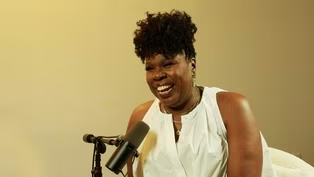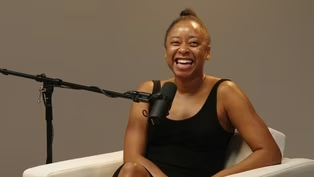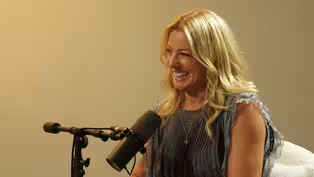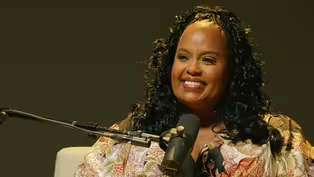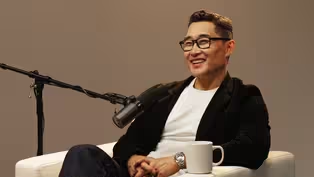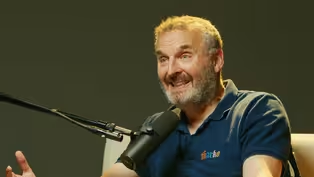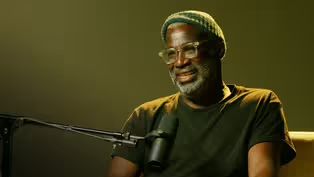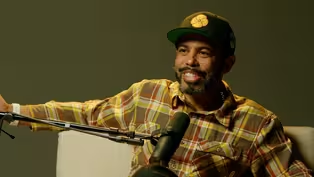
Lucy Dacus Makes Her First Loves Songs
Special | 23m 49sVideo has Closed Captions
Singer-songwriter Lucy Dacus talks about love songs for her new album, "Forever is a Feeling."
In this episode of American Masters: Creative Spark, singer-songwriter Lucy Dacus talks about love songs for her new album, "Forever is a Feeling."
Problems playing video? | Closed Captioning Feedback
Problems playing video? | Closed Captioning Feedback
Support for American Masters is provided by the Corporation for Public Broadcasting, AARP, Rosalind P. Walter Foundation, Judith and Burton Resnick, Blanche and Hayward Cirker Charitable Lead Annuity Trust, Koo...

Lucy Dacus Makes Her First Loves Songs
Special | 23m 49sVideo has Closed Captions
In this episode of American Masters: Creative Spark, singer-songwriter Lucy Dacus talks about love songs for her new album, "Forever is a Feeling."
Problems playing video? | Closed Captioning Feedback
How to Watch American Masters
American Masters is available to stream on pbs.org and the free PBS App, available on iPhone, Apple TV, Android TV, Android smartphones, Amazon Fire TV, Amazon Fire Tablet, Roku, Samsung Smart TV, and Vizio.
Buy Now
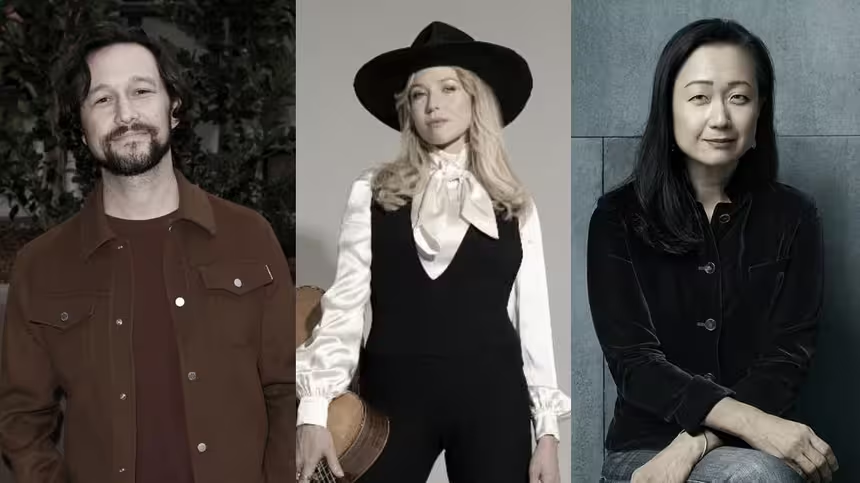
A front row seat to the creative process
How do today’s masters create their art? Each episode an artist reveals how they brought their creative work to life. Hear from artists across disciplines, like actor Joseph Gordon-Levitt, singer-songwriter Jewel, author Min Jin Lee, and more on our podcast "American Masters: Creative Spark."Providing Support for PBS.org
Learn Moreabout PBS online sponsorshipMore from This Collection
How do today’s masters create their art? "Creative Spark" presents narrative interviews that go in-depth with an iconic artist about the creation of a single work. Each episode offers a unique window into the world of art and the creative process of artists and cultural icons across a wide range of disciplines, from music and comedy to poetry and film.
How Leslie Jones Became a Comedian
Video has Closed Captions
Comedian and actress Leslie Jones does a deep dive on her creative process. (31m)
Phoebe Robinson Shows Her Work
Video has Closed Captions
Comedian Phoebe Robinson takes on hustle-culture in biting comedy special. (31m 45s)
Sarah McLachlan: Making Music to Connect and Heal
Video has Closed Captions
Singer-songwriter Sarah McLachlan opens up in a candid interview about making music. (37m 19s)
How Natasha Rothwell’s Life Brought Her to “The White Lotus”
Video has Closed Captions
Actress Natasha Rothwell on her creative process in "The White Lotus." (33m 40s)
Daniel Dae Kim Leads Spy Drama and Fights for Industry Change
Video has Closed Captions
Actor Daniel Dae Kim on his groundbreaking career and new project, "Butterfly." (21m 48s)
Phil Rosenthal’s Secret Recipe: Good Food and a Laugh
Video has Closed Captions
TV writer and host Phil Rosenthal talks about finding our shared humanity in food and comedy. (22m 53s)
Tunde Adebimpe Channels His DIY Roots Into Raw Solo Debut
Video has Closed Captions
Musician Tunde Adebimpe on his creative process behind his solo album debut. (37m 28s)
Daveed Diggs Takes on Cyberpunk Rap
Video has Closed Captions
Rapper and actor Daveed Diggs on his creative process as a rapper and songwriter. (25m 28s)
Providing Support for PBS.org
Learn Moreabout PBS online sponsorship- I have heard you say that, you know, this album "Forever is a Feeling," you're working towards love songs, maybe for the first time to really take it head on.
What's the value of a love song to you?
(soft tranquil music) - Hmm.
It's interesting 'cause I love a lot of love songs, but I was re-listening to an old playlist that I made and so many of them are like, "Don't leave me.
Love me forever, prove to me that you're mine."
They're very like ownership-based and like fear-based.
If you don't love me I'll die You know, through, like, weird threats or like, "If you don't love me, I won't love you."
I'm just like, that's not how it works.
Like things do change and love lingers where you wish it wouldn't and love leaves places that you wish it would stay.
And sometimes you can point to reasons and other times you can't.
- Mm.
- I think part of why heartbreak is so heartbreaking is like you feel rejected, you feel unwanted, you feel lonely all of a sudden, but realizing that love comes from more places than romance, like you will love again.
There is not one soulmate per person.
Yeah, just, like, embracing temporality, I think it makes love richer and I think it makes life easier to bear.
I hear myself saying big words but I do think that.
(tranquil music) - Hi, I am Joe Skinner and this is "American Masters Creative Spark."
In each episode our guest breaks down their creative journey behind a single work of art.
Today I spoke with singer songwriter Lucy Dacus about her new album "Forever is a Feeling."
She's described the album as her first time really trying to write love songs.
And the stakes couldn't be higher for her first foray into the genre.
Lucy has increased attention on her every word following the massive success of her Grammy award-winning supergroup Boygenius.
"Forever is a Feeling" is also her first solo release on a major label, Geffen Records.
So I met up with Lucy in her relatively new hometown of Los Angeles and sometimes when you're far from home and under the spotlight it can be even more important to remember where you came from.
For Lucy, that story begins in Richmond, Virginia.
(mellow music) - Richmond's local scene is so awesome.
And growing up there and going to high school and college in the city was great because people were really having house shows all the time.
I lived in a show house, a lot of friends had show houses like one of my friends' bands would like write a song and be like, "Oh, let's do a show tomorrow to show everyone the new song."
Like, that was enough of a reason.
And Richmond also like was not industry oriented, which is great because I never thought about people's intentions when they were playing music.
Like it really was just about the music.
- Yeah.
There's something a lot more pure about that.
Like it's a very special thing, I think those local shows.
Do you remember like what your first experience was with a local show growing up, like performing or going to?
- I went to a show at a place called Gallery Five that was an art gallery and like an old firehouse.
And I saw this band called Hot Lava.
They're famous in my mind, this Richmond band that has disbanded and I still listen to their record.
("Apple+option+fire" by Hot Lava) Yeah, my, like, first love took me to this after school one day and it was like the whole world changed.
And then the first show that I played, I guess I had told friends that I wrote music and like had showed some friends and then it kind of like spread like a rumor.
And then this local band Lobo Marino asked me to open for them.
They're like "We heard you have songs.
You're always in the crowd.
We're gonna make you play your songs."
Which was cute because like, I don't know, it was just like peer pressure but good.
And, yeah, I was so nervous.
I still get nervous though.
You think that it would go away, but for me it hasn't really gone away.
- From her youth playing Gallery Five in Richmond, Virginia, through the time she spent daydreaming while at a day job at a local photo studio, Lucy had always had musical ambitions stirring inside.
By the time she was around 20, she'd started playing shows in New York City.
In no time she was signed to a label and released her debut album called "No Burden," and a couple of years later her second album "Historian."
It's "Historian" that really took off, highlighted by the lead single "Night Shift."
♪ You got a nine to five, so I'll take the night shift ♪ ♪ And I'll never see you again if can help it ♪ - NPR Music listeners picked the song as one of the top 25 songs of the 2010s.
It's a breakup song and even though that particular track is about a former band member, it still brings me back to her Richmond days when she was a kid and she was trying to write her very first songs from the heart, her first stab at songwriting.
When did it feel like you were like first doing it to like get something off your chest or like express yourself?
- My first love went to college and started dating a poet who was so cool.
And I was like, "I wish I was that cool."
And so then I started like writing poetry and music kind of at the same time.
And yeah, just like basically dealing with my first heartbreak.
I feel like that might be like a common answer you would get about heartbreak is like the place for a lot of people.
- It's a very devastating experience to have, so that makes sense.
- You're like no one has ever felt this bad ever.
I feel like everybody's first heartbreak is, like, profound.
- But I think that's what's so great about making things when you're at that young age too, 'cause you have such a limited perspective.
So it's like working within those limitations, like working within the limitation of working at a photo job and having to think about your art outside of that.
Like, I think that can make really beautiful things.
- I still mine, like when I'm writing a song and there's like these missing pieces, I'll flip through old things that I wrote and I'll go back as far as high school sometimes and there are even some, I have like these darlings, I'm like never kill your darlings, just think about other things 'cause they'll come back and I have a ton of living darlings.
Just like on this record, like, things come back around all the time.
- Her third album came in 2021 called "Home Video," and it's widely considered her most autobiographical and vulnerable release to date.
The track "Thumbs" in particular was written about her accompanying a college friend to visit their estranged father for the first time in years.
♪ You hung up the phone and I asked you what was wrong ♪ ♪ Your dad has come to town he'd like to meet ♪ - In some ways the song is a precursor to Lucy's current interest in love songs.
"Thumbs" is an unconventional love song, the love she has for a close friend.
There's an obvious softness to Lucy's music but also often a biting undercurrent.
I really enjoy the dichotomy.
♪ I would kill him if you let me ♪ ♪ I would kill him quick and easy ♪ - The question I had for Lucy is, does she begin with a clear idea that she knows she wants to express or does she discover what she's trying to say in the process of creating?
- I think that sometimes I'll be like I think I'm writing about love and then I'll find out what I think from what I write instead of being like, "You know what I think?
And I'm gonna write a song about it."
Like, the writing is the research project of my own thoughts.
And do you know the photographer Hiroshi Sugimoto by chance?
He's one of my favorite artists and each of his series you can tell that basically he was like, "I wonder what this would look like?"
So there's some pre-thought, there's like basically he takes photos of whole movies on really low-aperture so that the screen is white by the end of the movie, but the inside of the theater is illuminated.
Or like he took pictures of a bunch of Madame Tussaud sculptures and I feel like you can tell that he's like learning about his thesis through the work itself.
I feel like I think that way too.
- With Lucy's new record "Forever is a Feeling," I really wanted to figure out how long she had to keep the aperture open on the photo, so to speak.
How long does she let the music and lyrics simmer before she arrives at a finished song?
And how does she find the time to create new music while juggling the demands of life on tour and navigating the growing spotlight that comes with being part of the Grammy-winning supergroup Boygenius?
- A lot of it I wrote before Boygenius.
Yeah, actually most of it was written before, a little bit during and then a little bit after.
Like, the most recent song is "Best Guess," which I wrote in July of 2024.
And like come out the boardroom described in the first verse was like some label trying to sign Boygenius, just boring me to tears and trying to be hip.
And I was just like, I was so in love with someone.
I was like, "I can't believe that I'm here and not in your arms" ♪ I missed your call because I was in a boardroom ♪ ♪ Full of old men guessing what the kids are getting into ♪ ♪ There was a cardboard cutout of a cowboy in the corner ♪ ♪ Pointing his gun in my face ♪ - That one has the harp and the celeste.
That's another instrument we use on a ton of songs that is basically just like a special piano.
And yeah, I think they definitely sound more romantic than other songs I've made.
It's even like a little over the top sometimes.
♪ So come out, come out wherever you are ♪ ♪ I miss you, I miss you, I miss you in my arms ♪ - So, you know, you mentioned string instruments and I'm curious if you could talk about the soundscape that you developed for the album and is that speaking to, like, broader themes that you're exploring?
- You know, I wrote the songs and I actually wrote a lot of them while walking around museums.
And like there's a song called "Modigliani" that I wrote mostly at the Barnes Museum in Philly.
I was thinking about how, like, love feels so profound and like singular when you're experiencing it, but people have been making art about love forever, like since art started, like since people started.
(both chuckling) And so I wanted all the visuals to kind of like live in this classical, historic, beautiful spaces.
And so when producing I was like, we should bring in some instruments that feel really beautiful and, like, connected to an older history than just like electric guitars.
And so there's violin, there's some harp, there's the way some of the acoustic guitars are played.
Feels a little bit like classical guitar and there's pedal steel that we kind of made sound like strings.
I actually have pedal steel on every record that I've made, but people don't notice because my friend Collin Pastore that has produced everything that I have made is a pedal steel player and so yeah, we use and abuse the pedal steel.
- You can see the influence of fine art and literature in a lot of Lucy's work.
The music video for one of her new singles "Ankles" follows her around the streets of Paris in a bold red corseted gown, custom-made by Rodarte.
♪ Pull me by the ankles to the edge of the cliff ♪ ♪ And take me like you do in your dreams ♪ ♪ I'm not gonna stop you ♪ ♪ I'm not gonna stop you this time, baby ♪ - I feel like you've talked a lot about literature having an influence on you.
Are you still inspired by literature when you're writing?
- For sure.
I feel like I'm not good enough to write a book and I just read books with, like, awe.
Yeah, and again, like, classic literature, it's often cliche for a reason.
Like, classics hold up a lot of the time and speak to something that's been true forever and will continue to be true.
And I think that's kind of a good goal for songs.
Not across the board.
There are a lot of really fun songs that are just completely vapid and speak to something very current and probably get dated really quickly.
But I guess I'm interested in just stuff that, like, has sticking power in a way.
(mellow music) - Lucy is in pursuit of making timeless art, and what is more timeless than religious storytelling and expression?
She grew up in a Christian household and although she no longer considers herself a believer, she has still identified as culturally Christian.
So I was really curious to ask her how that cultural identity might still show up in her work and in her life.
It's actually something I had asked R.O.
Kwon back in 2019, when I was interviewing the author about her book "The Incendiaries."
She had similarly been raised in a Christian household but fell out of the faith.
Here's that clip.
- [R.O.
Kwon] I haven't left with an appetite for ecstasy, an appetite for transcendence.
Was I drawn to religion because I already, like, really enjoyed the ecstatic or am I still drawn to the ecstatic because I was so religious for so long?
(mellow music) - I feel like I've taken so much from church into work, into my life, I mean, it follows you for better or worse and I feel like it's predictable the ways that it would be worse but maybe kind of unpredictable the ways it's for the better.
And, like, I learned so much about patience and generosity and forgiveness at a young age and kind of like the express goal of like taking care of each other and respecting people and advocating for marginalized communities.
I mean there's a lot of socialism in what Jesus talks about.
And yeah, I've been kind of coming back around to be like, "I'm glad I had some of these lessons when I was young."
Also was like asked to think about death a lot as a kid and just like reckoning with that that's a reality.
I feel a little bit more prepared for life.
I think my friends that like never thought about death until like one of their parents dies in their 30s.
I'm like, "Whoa, you haven't been thinking about this?
This is a huge thing.
I can't believe you got by this long without thinking about this."
But also maybe that is better to just delay or maybe there's not a better or worse.
But yeah, in terms of like my art, music being something that requires people together to enjoy it, that feels like necessary.
Like even, like, putting out music, I don't like it.
What I like is playing shows.
And I like that it exists for people to get whenever they want, they can buy it and they can be their their friend, but it's not real to me until it, like, brings people together, like, physically.
And playing shows definitely has an aspect of church in a good way.
I definitely took a lot and not just from the Bible and the religion, but I grew up doing service work all the time, like multiple times a week.
Just being like, "Yeah, this is what people do is you go out of your way to help each other."
This job does make it kind of hard.
Like, it's a very self-centered world.
Like I'm always talking about Lucy Dacus, like, I don't know.
(laughs) It's like I'm over it.
(laughs) - Well it's interesting too because, you know, you're known for writing really personal music.
So, I'm curious, as somebody that writes really personal music, how do you think about politics and about your place in society, like through your art making, or do you see those as sort of separate things?
- I don't see it as separate at all.
That's actually what I would say.
I did an interview recently with a person who's like, "I love all your activism," and then after the call I was like, "I should have said something," 'cause like I don't feel like "activism" is a good word or construct 'cause it makes it seem like a hobby that you get into that is not your life.
Where being like, "Oh, like the things that you're organizing or donating," that's like ancillary or optional or just an aspect of you.
And I think that more people would, I don't know, engage with those things if it didn't feel intimidating to like be like, "oh, I'm not an activist," or like that's somebody else's prerogative, that that's for activists to take care of.
But yeah, it's been interesting.
This is the first time I've put out a record, kind of like Boygenius it was a very gay time.
This is the first record of my own that that's I think really at the forefront.
Just because it has to do with the people that I love and I haven't really talked about that in songs very much.
But yeah, I think you're born a political body, so to be like, "I'm not thinking about politics" is in a way negligent.
But then on the flip side, you can only represent yourself and, I guess, like by being gay and around there's like a political tone to just living and I have so many trans friends that are currently being affected by some executive orders.
Yeah, I'm not sure how much that gets into the music, but it definitely gets into how I structure my tours and like raise money for people through ticket sales and merch and just the money I make, I try to unhand often.
I think also for me it's so much harder to give a positive example.
Like, we could sit here and be like listing everything that sucks and like people that suck and like it's way harder for me to be like, "You know what, that person has it figured out."
Or "That person is living in a way that I respect."
So I do try to like, yeah, be joyful when possible and not have that negate any of like the sorrow or grief.
It's just like if you're gonna be fighting for a life or if you're fighting for existence and rights, you also have to like live that life that's worth fighting for and be enjoying it and be centered back into why it's worth defending.
Yeah.
(laughs) - No, I think that's a really beautiful answer.
And sort of gets us towards the end of this interview where I was gonna just ask tangentially to that, you know, what do you hope people take away from the album?
Which might be sort of a similar answer, I'm not sure.
- I wish that people would not treat love like constitutional law.
I wish that people would allow themselves to experience negative emotions without needing to justify themselves as right or wrong in a situation.
There's gotta be more nuance.
I think that we cause each other a lot of pain and honesty is key and real love can take it, and real love might look like coming together, it might look like coming apart.
And go talk about it if you love someone.
Like, don't be afraid.
And if you don't love someone, also talk about that.
Like, have courage.
So that's kind of a long answer and like really high hopes, but.
- [Joe] It's good to set the bar up there.
- Yeah.
(Joe chuckles) (mellow music) - [Joe] That's our show.
A huge thank you to Lucy Dacus for joining us today.
(mellow music) (inspiring music)
Support for PBS provided by:
Support for American Masters is provided by the Corporation for Public Broadcasting, AARP, Rosalind P. Walter Foundation, Judith and Burton Resnick, Blanche and Hayward Cirker Charitable Lead Annuity Trust, Koo...

